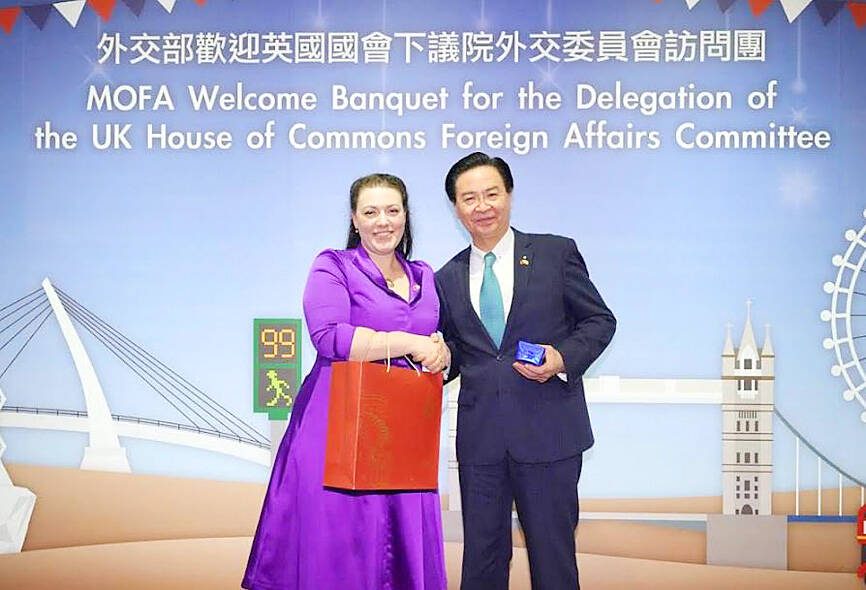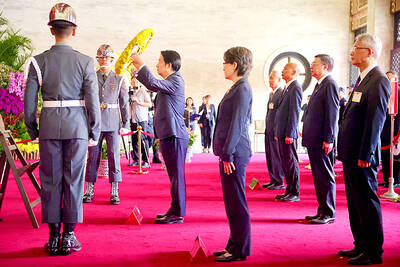Taiwan and the UK, although geographically far apart, are closely connected through their shared values, British lawmaker Alicia Kearns said on Wednesday.
Kearns made the remarks at a dinner banquet in Taipei, where Minister of Foreign Affairs Joseph Wu (吳釗燮) hosted Kearns as the head of a delegation from the British House of Commons. The seven-member delegation also includes British lawmakers Royston Smith of the Conservative Party, Liam Byrne of the Labour Party, Stewart McDonald of the Scottish National Party and Neil Coyle, an independent.
Kearns, who was in October elected chair of the House Foreign Affairs Select Committee, said Taiwan is not alone in the world, vowing that the British Parliament would remain committed to supporting its democratic partner.

Photo courtesy of the Ministry of Foreign Affairs
Wu thanked the delegation for showing support for Taiwan and thanked the UK for adopting an “Indo-Pacific tilt” in last year’s Integrated Review, declaring the region an area of strategic importance.
The Indo-Pacific region is a geopolitical and economic powerhouse containing vital shipping routes, involving key interests of the UK and other global powers, he said.
Upheavals in the international situation in the past few months have highlighted the importance of like-minded partners banding together to resist the spread of authoritarianism, Wu added.
The “deeply significant” visit is the first by an official British parliamentary delegation since COVID-19 border controls were implemented nearly three years ago, the ministry said.
The lawmakers, who arrived on Tuesday, are also slated to meet with President Tsai Ing-wen (蔡英文) today before they are to depart tomorrow.
Separately yesterday, the Ministry of Foreign Affairs thanked the European Parliament Committee on Foreign Affairs for reiterating support for Taiwan in two annual policy reports.
The committee on Wednesday approved implementation reports on the Common Foreign and Security Policy and the Common Security and Defence Policy, in which it called Taiwan a key partner of the EU and a democratic ally in the Indo-Pacific region, the ministry said in a news release.
It also called on top EU officials to establish strategic interactions with Taiwan, including high-level exchanges in economics, science, culture and politics, while reiterating last year’s call for a bilateral investment agreement.
The reports also condemn China’s continued military provocations against Taiwan and reaffirm the EU’s resolute opposition to any unilateral attempt to change the “status quo” in the Taiwan Strait.
The resolutions are to be voted on in the European Parliament next month.

RESPONSE: The transit sends a message that China’s alignment with other countries would not deter the West from defending freedom of navigation, an academic said Canadian frigate the Ville de Quebec and Australian guided-missile destroyer the Brisbane transited the Taiwan Strait yesterday morning, the first time the two nations have conducted a joint freedom of navigation operation. The Canadian and Australian militaries did not immediately respond to requests for comment. The Ministry of National Defense declined to confirm the passage, saying only that Taiwan’s armed forces had deployed surveillance and reconnaissance assets, along with warships and combat aircraft, to safeguard security across the Strait. The two vessels were observed transiting northward along the eastern side of the Taiwan Strait’s median line, with Japan being their most likely destination,

‘NOT ALONE’: A Taiwan Strait war would disrupt global trade routes, and could spark a worldwide crisis, so a powerful US presence is needed as a deterrence, a US senator said US Senator Deb Fischer on Thursday urged her colleagues in the US Congress to deepen Washington’s cooperation with Taiwan and other Indo-Pacific partners to contain the global security threat from China. Fischer and other lawmakers recently returned from an official trip to the Indo-Pacific region, where they toured US military bases in Hawaii and Guam, and visited leaders, including President William Lai (賴清德). The trip underscored the reality that the world is undergoing turmoil, and maintaining a free and open Indo-Pacific region is crucial to the security interests of the US and its partners, she said. Her visit to Taiwan demonstrated ways the

GLOBAL ISSUE: If China annexes Taiwan, ‘it will not stop its expansion there, as it only becomes stronger and has more force to expand further,’ the president said China’s military and diplomatic expansion is not a sole issue for Taiwan, but one that risks world peace, President William Lai (賴清德) said yesterday, adding that Taiwan would stand with the alliance of democratic countries to preserve peace through deterrence. Lai made the remark in an exclusive interview with the Chinese-language Liberty Times (sister paper of the Taipei Times). “China is strategically pushing forward to change the international order,” Lai said, adding that China established the Asia Infrastructure Investment Bank, launched the Belt and Road Initiative, and pushed for yuan internationalization, because it wants to replace the democratic rules-based international

WAR’S END ANNIVERSARY: ‘Taiwan does not believe in commemorating peace by holding guns,’ the president said on social media after attending a morning ceremony Countries should uphold peace, and promote freedom and democracy, President William Lai (賴清德) said yesterday as Taiwan marked 80 years since the end of World War II and the Second Sino-Japanese War. Lai, Vice President Hsiao Bi-khim (蕭美琴) and other top officials in the morning attended a ceremony at the National Revolutionary Martyrs’ Shrine in Taipei’s Zhongshan District (中山) to honor those who sacrificed their lives in major battles. “Taiwanese are peace-loving. Taiwan does not believe in commemorating peace by holding guns,” Lai wrote on Facebook afterward, apparently to highlight the contrast with the military parade in Beijing marking the same anniversary. “We